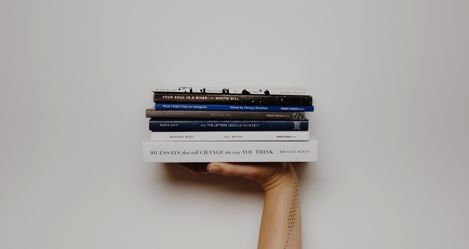
3 Non-Joy Reasons to Hold Onto a Book
By now you have been delighted by Marie Kondo’s new Netflix show, enraged by the no-more-than-30-books meme, and read the explainers de-bunking that myth and detailing why Kondo is not, in fact, our generation’s Captain Beatty and is still the adorable bundle of joy wrapped in a human-shaped package you saw on TV.
Great.
If you’re anything like me, you’ve also had the same nagging voice in the back of your head to stop slacking get your life in order and start 2019 with a clean slate.
(How does your voice sound so much like my mother? A conversation for another time I suppose.)
But this thought has also come with a resistance. Because the category of my life with the most clutter is most certainly my book collection, and book quotas aside, I have a lot of books I refuse to let go of for reasons that have nothing to do with joy.
When it comes to our books, as this Vox article suggests, it may be more fruitful to instead ask yourself, “Does this book hold value for me?”
Here are three ways books can hold value that have little to do with evoking joy.
1. I’m still wrestling with it.
No matter how much a book is loved, I’d agree with Kondo’s assertion that very few of them will ever be re-read, no matter how much I intend to.
But there are some books that demand multiple readings. Stories that simple take more than one consumption to fully digest. Or that mean different things to me at different points in my life.
For example, no matter how many times I read Jane Eyre, the story always seems to change as much as I have since the last time I picked it up, each of the characters almost new in how I interpret them.
So on my shelf it will stay.
2. The book represents an important point in my life.
Some books get us through tough times, or come to us at an important tipping point in our lives. And because of that particular timing for when we read them, for better or for worse, they become wholly entangled with that important time in our lives.
Afterwards—for me—that entanglement makes those books important and special. They may not bring back the happiest of memories, but they were good friends in hard times. They remind me of who I used to be and how I became who I am.
For this reason, they will never be cast aside.
3. The book challenges my thinking.
This category may be the hardest to justify, because I will not necessarily re-read these books. But they represent an idea that I do not want to lose.
The Jungle. Anna Karenina. 1984. The themes in great works are often difficult and the endings sometimes grim. But once their passages are in your mind, you may never be the same.
Even by just revisiting their titles as I skim my bookshelf, they remain present within me, and that is something I am not willing to unclutter from my life.












